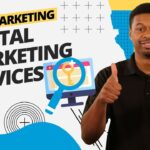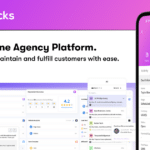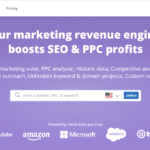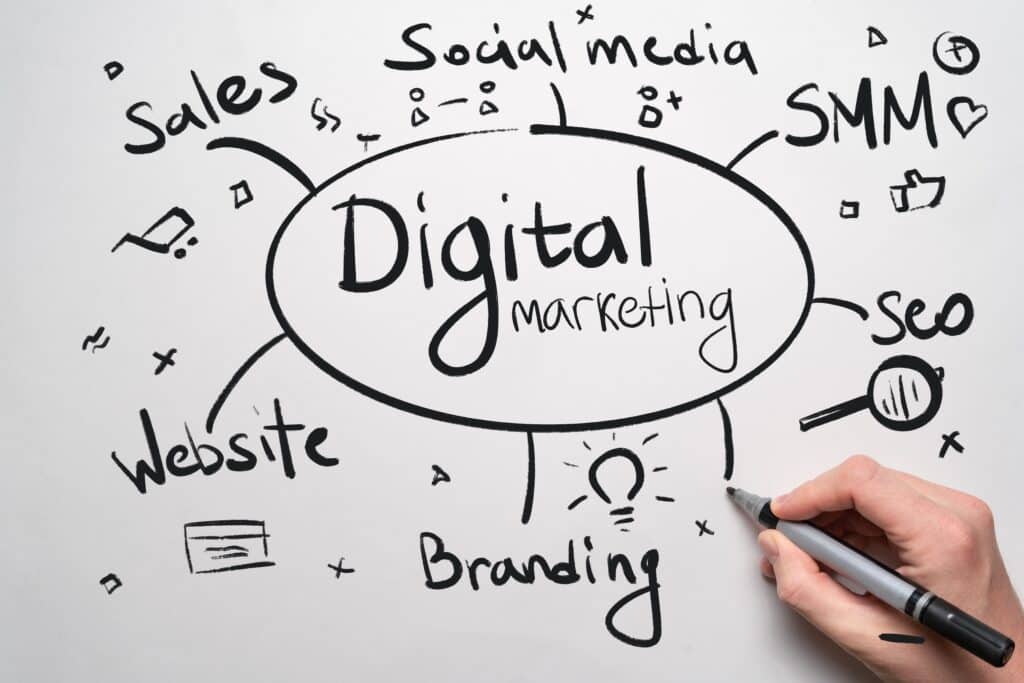
Are you curious about what digital marketing is and how it can benefit your business? Look no further! In this article, we’ll explore the definition, importance, and types of digital marketing.
Discover how this powerful tool can drive your business towards success. So, whether you’re a small business owner or a marketing enthusiast, get ready to dive into the world of digital marketing and unlock its potential for your brand.
Key Takeaways
- Affiliate marketing utilizes industry experts and influencers to promote products or services.
- Content marketing focuses on storytelling and providing value to consumers.
- Email marketing is an effective technique for converting audiences into customers.
- Marketing analytics helps measure and analyze marketing performance to make data-driven decisions.
Definition of Digital Marketing
Digital marketing is the process of advertising and promoting products or services using online platforms and through targeted digital strategies. It’s a form of marketing that allows businesses to reach their target audience in a more direct and personalized way.
With digital marketing, you can leverage various online channels such as social media, search engines, email, and websites to connect with potential customers. By utilizing these platforms, you can create engaging content, run targeted ads, and track the performance of your campaigns in real-time.
Additionally, digital marketing enables you to gather valuable data and insights about your audience, allowing you to make informed decisions and optimize your marketing efforts.
In today’s digital age, having a strong digital marketing strategy is crucial for businesses to stay competitive and grow their online presence.
 Click to read the review of LYFE Marketing
Click to read the review of LYFE MarketingImportance of Digital Marketing
To understand the significance of digital marketing, you must recognize its pivotal role in driving business growth and expanding online reach. In today’s digital age, consumers are increasingly relying on the Internet to find products and services.
By implementing effective digital marketing strategies, businesses can reach a wider audience and engage with potential customers in a more personalized and targeted manner. Digital marketing allows for precise targeting, enabling businesses to tailor their messages to specific demographics and interests.
Moreover, digital marketing provides measurable results, allowing businesses to track and analyze their marketing efforts in real time. This data-driven approach helps businesses optimize their campaigns and make informed decisions to drive better results.
In a highly competitive marketplace, digital marketing is essential for businesses to stay relevant, connect with customers, and drive sustained growth.
Benefits of Digital Marketing
By utilizing digital marketing strategies, you can experience a wide range of benefits for your business. One of the major advantages is the ability to reach a global audience. With digital marketing, you can target specific demographics and geographic locations, allowing you to expand your customer base beyond local boundaries.
Additionally, digital marketing offers a cost-effective solution compared to traditional marketing methods. You can allocate your budget more efficiently and measure the success of your campaigns in real-time.
Moreover, digital marketing allows for greater personalization and customization. You can tailor your messages and offers to individual customers, increasing the chances of conversion.
Lastly, digital marketing provides valuable insights and analytics, enabling you to make data-driven decisions and continuously optimize your strategies for better results.
8 Main Types of Digital Marketing
Moving forward, let’s dig deeper into the world of digital marketing by focusing on its main types and related strategies.
1. Affiliate Marketing
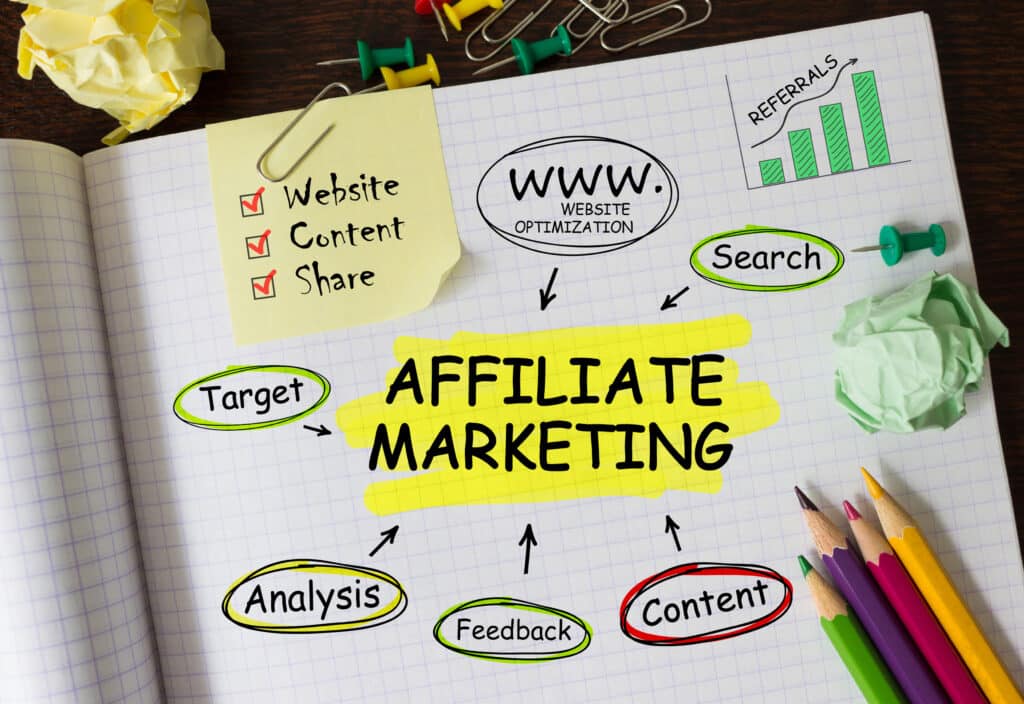
Affiliate marketing allows you to leverage industry experts and social media influencers to promote products or services for compensation. By forming influencer partnerships, you can maximize the impact of your affiliate marketing campaigns.
Social media influencers have a significant following and can help you reach a wider audience. Their authority and credibility can influence their followers’ purchasing decisions, leading to more conversions and sales.
To run successful affiliate marketing campaigns, it’s crucial to leverage social media influencers effectively. Choose influencers whose values align with your brand and target audience. Collaborate with them to create engaging and authentic content that resonates with their followers. Provide them with unique discount codes or affiliate links to track their performance.
2. Content Marketing
Content marketing is all about using storytelling and information sharing to increase brand awareness. It focuses on providing value to the consumer rather than just advertising the brand.
Content marketing works in symbiosis with other types of digital marketing like SEO, social media, and email marketing.
A key aspect of content marketing is building a library of content that continues to bring users to the site via search engines. It’s a long-term strategy that promotes knowledge of the brand and establishes authority.
When it comes to effective email marketing techniques for higher conversion rates, content marketing plays a crucial role in providing value to consumers and converting audiences into customers.
3. Email Marketing
To effectively implement email marketing in your digital marketing strategy, start by understanding the importance of engaging your audience through personalized and compelling campaigns.
Despite the rise of social media, email marketing remains one of the most effective techniques for converting audiences into customers. Creating effective email campaign strategies is key to maximizing open rates and click-through rates.
To make your emails more appealing, consider creating a sense of urgency and personalizing the content. Analyzing customer interactions and optimizing audience outreach are crucial for improving the performance of your email campaigns.
What should be the length of your email content- Let’s see
4. Mobile Marketing
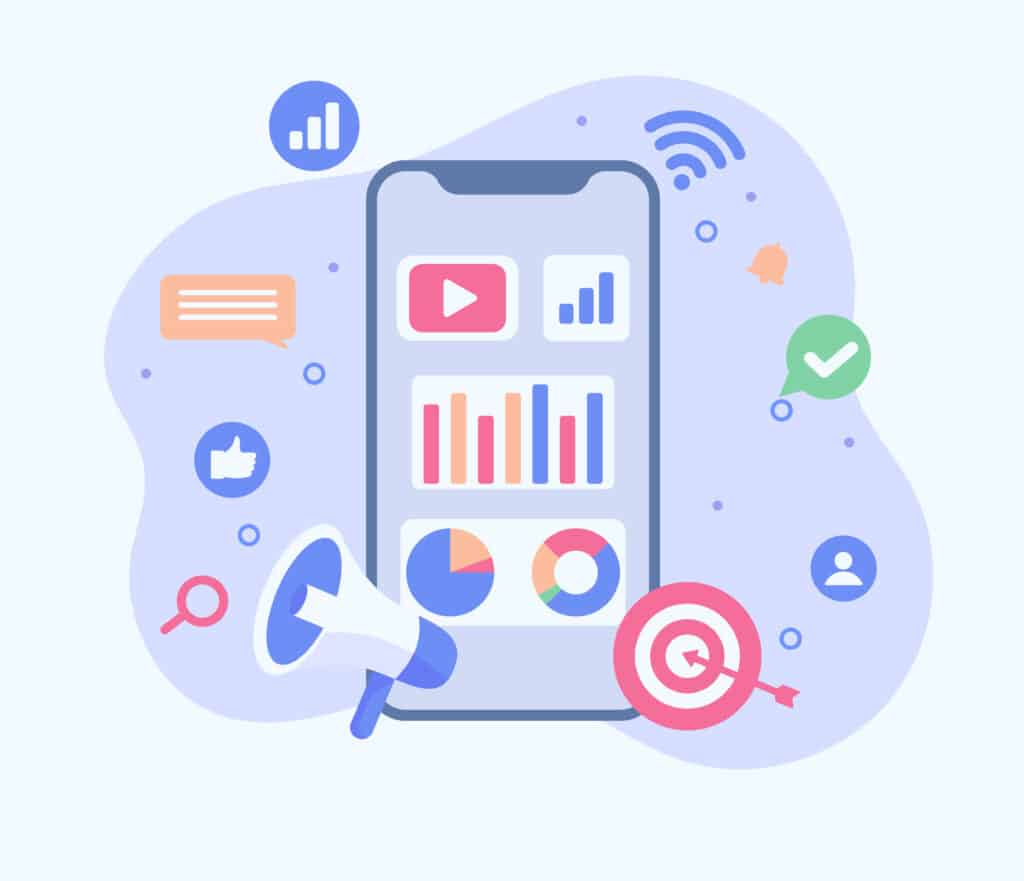
Mobile marketing targets a growing number of mobile users globally, reaching them anytime, anywhere. It encompasses various techniques such as mobile advertising, mobile apps, and mobile-optimized websites.
One key aspect of mobile marketing is its ability to target Gen Z consumers, who are known for their heavy mobile device usage. To effectively reach this demographic, marketers can employ strategies such as influencer collaborations, interactive mobile ads, and personalized mobile experiences.
Additionally, mobile marketing has a significant impact on local businesses. With the prevalence of smartphones, consumers often search for local products and services on their mobile devices. By utilizing mobile marketing tactics like location-based marketing and mobile search advertising, local businesses can effectively target and attract nearby customers.
Moreover, mobile marketing enables businesses to engage with their audience in real-time, creating opportunities for immediate conversions and building strong customer relationships.
5. Pay-Per-Click (PPC)
Now let’s delve into the world of Pay-Per-Click (PPC) advertising and explore its impact on digital marketing strategies.
PPC advertising involves paying for each click on an online ad. It’s used in search engine advertising, display advertising, and social media advertising.
When it comes to driving website traffic, PPC and SEO are both effective strategies, but they’ve different advantages.
PPC provides immediate visibility and allows you to target specific keywords and demographics, resulting in better conversion rates.
On the other hand, SEO focuses on improving a website’s visibility and ranking organically in search engine results pages.
When it comes to mobile marketing, optimizing pay-per-click advertising for mobile devices is crucial.
6. Search Engine Optimization (SEO)
To continue the discussion on digital marketing strategies, let’s explore the importance of Search Engine Optimization (SEO) in driving organic traffic and improving website visibility.
SEO is a crucial component of any successful online marketing campaign. By optimizing your website content for SEO, you can increase your chances of ranking higher in search engine results pages. This means that when people search for relevant keywords or phrases, your website has a better chance of appearing at the top of the search results.
The impact of SEO on organic traffic is significant. When your website ranks higher in search engine results, more people are likely to click on your website, resulting in increased organic traffic.
So, how can you optimize your website content for SEO? It starts with conducting keyword research and incorporating those keywords strategically into your website content. Additionally, optimizing your metadata, building high-quality backlinks, and ensuring that your website loads quickly are all important factors in improving your website’s SEO.
7. Social Media Marketing
When it comes to digital marketing, social media marketing is an essential strategy that allows you to promote your products and engage with customers on various social media platforms.
Social media platforms like Facebook, Instagram, Twitter, and LinkedIn offer targeted advertising options, making it easier to reach your desired audience. Building a social media presence helps build brand awareness, drive website traffic, and generate leads.
One key aspect of social media marketing is the use of social media influencers. These influencers have a large following and can greatly impact the success of your marketing campaigns by promoting your products to their audience.
Additionally, social media platforms play a crucial role in brand building and customer engagement. They provide a space for businesses to interact with their audience, share valuable content, and create a community around their brand.
8. Marketing Analytics

As you delve deeper, it’s essential to understand the power of marketing analytics in optimizing your strategies and maximizing your return on investment.
Marketing analytics involves measuring, managing, and analyzing marketing performance to make data-driven decisions. By understanding customer behavior through marketing analytics, you can gain insights into their preferences, demographics, and buying patterns. This information allows you to tailor your marketing efforts to target the right audience with the right message at the right time.
Additionally, marketing analytics helps you track key metrics such as customer acquisition cost, conversion rate, customer lifetime value, and return on investment. By leveraging data-driven marketing analytics, you can make informed decisions that will maximize your ROI and drive business growth.
How Digital Marketing Can Drive Success
Driving business success through digital marketing requires understanding and leveraging the power of data-driven strategies. In today’s digital age, businesses have access to vast amounts of data about their customers, their behaviors, and their preferences.
By analyzing this data, you can gain valuable insights that can help you make informed decisions and tailor your marketing efforts to reach the right audience at the right time.
Digital marketing allows you to target specific demographics, track the effectiveness of your campaigns in real-time, and make adjustments accordingly. With the ability to reach a global audience, digital marketing offers unparalleled opportunities for business growth and expansion.
Wrapping Up
Overall, digital marketing is a crucial tool for businesses to effectively reach their target audience and drive success.
By leveraging various digital platforms and strategies, businesses can expand their online presence, engage with customers, and ultimately increase their brand awareness and sales.
So, whether you’re a business owner or a marketing professional, make sure to explore and utilize these digital marketing tactics to stay ahead in the ever-evolving digital landscape.
Frequently Asked Questions (FAQ)
How Does Digital Marketing Differ From Traditional Marketing Methods?
Digital marketing differs from traditional marketing methods in several ways. Firstly, it leverages digital channels such as social media and search engines. This allows businesses to reach a wider audience and target specific demographics. Additionally, digital marketing provides the ability to track campaign performance in real-time. This means that businesses can quickly adjust their strategies and optimize their campaigns for better results.
What Are the Common Challenges Faced by Businesses in Implementing Digital Marketing Strategies?
Common challenges businesses face in implementing digital marketing strategies include
- Lack of technical expertise
- Limited budget
- Difficulty in keeping up with rapidly changing trends
How Can Businesses Measure the Success of Their Digital Marketing Campaigns?
To measure the success of your digital marketing campaigns, you can track key metrics like
- Website traffic
- Conversion rates
- Engagement levels
What Are Some Common Challenges Faced by Marketers in Content Marketing and How Can They Overcome Them?
To overcome content marketing challenges, focus on creating valuable content, understanding your target audience, and analyzing data. Use storytelling techniques, collaborate with influencers, and optimize for search engines. Consistency and adapting to trends are key.
What Are the Key Metrics That Marketers Should Track and Analyze in Email Marketing Campaigns?
To track and analyze your email marketing campaigns, focus on key metrics like open rate, click-through rate, and conversion rate. By optimizing these metrics, you can improve your email marketing ROI. Best practices include creating compelling campaigns and personalizing emails.
What Are Some Effective Strategies and Techniques for Mobile Marketing to Reach and Engage Mobile Users Effectively?
To effectively reach and engage mobile users, utilize mobile targeting and mobile advertising strategies. Optimize your campaigns for mobile devices, leverage location-based marketing, and consider SMS marketing to connect with your audience on the go.

